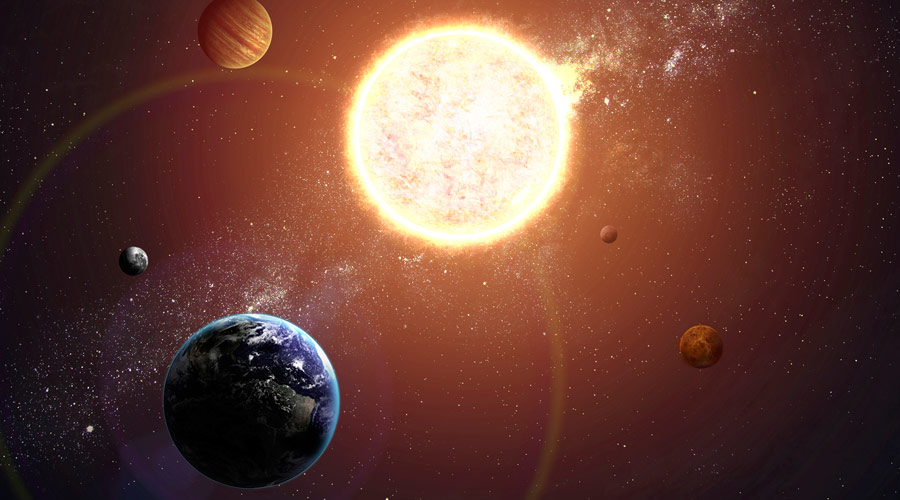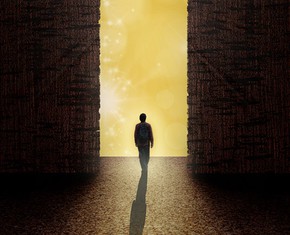The views expressed in our content reflect individual perspectives and do not represent the authoritative views of the Baha'i Faith.
Some people think that while life could be wonderful, humanity is just too flawed, corrupt or generally inept. Others think that the world we’ve built is essentially broken, and the best we can do is struggle for whatever mote of peace we’re able to find.
In this picture of the world, God’s messengers are seen as agents of a merciful, but distant Entity, sent to help us fix what our sins have wrought. But with time, even the institutions the prophets bring get perverted by man. Evil runs rampant, the innocent are oppressed, sorrow and hardship afflict the least deserving, and where is God? Why aren’t His messengers a bit more effective, so all this heartache can end at least? Why does God let it all happen?
In the mystical writings of the Baha’i Faith, we find indications that not everything is as it seems: that a deep perfection exists in the scheme of the world, even with its wars and venomous anger. The writings of Baha’u’llah suggest that we could potentially “attain a station wherein one seeth no distinction amongst His creatures and findeth no flaw in the creation of the heavens and the earth.” – Gems of Divine Mysteries, p. 6.
They also say that a wayfarer on the path of God might “seeth in the fashionings of the True One nothing save clear providence, and at every moment saith: ’No defect canst thou see in the creation of the God of Mercy: Repeat the gaze: Seest thou a single flaw?’” – The Seven Valleys, p. 12; Qur’an 67:3.
In his book of mystical aphorisms, The Hidden Words, Baha’u’llah wrote:
O Fleeting Shadow! Pass beyond the baser stages of doubt and rise to the exalted heights of certainty. Open the eye of truth, that thou mayest behold the veilless Beauty and exclaim: Hallowed be the Lord, the most excellent of all creators! – p. 25.
To make sense of these statements, we have to reorient our thinking about the ultimate purpose of this life. If we imagine its aim our personal happiness and joy, it becomes hard not to see the world as a miserable joke for all but the favored few. However, this perspective fails to make sense of existence because it chooses a wrong center: human beings. This perspective revolves the Sun of Truth around man’s sense of well-being, and diminishes virtue by favoring more immediate and more material concerns, such as health, prosperity and long life.
 If we change this perspective, and interpret our motions in reference to a central Sun, we may find creation purpose-built with a singular objective: for humanity to truly recognize the prophets of God, a recognition that only begins with accepting their unified mission, and has no end in a person’s lifetime. We are most sensitive to light when plunged in darkness, and our heart is attuned to even minute joys when sadness abounds. How can anyone know God, if we only gain real knowledge through contrast? In a way, this earthly existence is as “not God” as it is possible to be, so that with parched and thirsty lips we may drink one drop of the Divine Elixir—the Writings of His holy ones—and recognize their savor in an instant.
If we change this perspective, and interpret our motions in reference to a central Sun, we may find creation purpose-built with a singular objective: for humanity to truly recognize the prophets of God, a recognition that only begins with accepting their unified mission, and has no end in a person’s lifetime. We are most sensitive to light when plunged in darkness, and our heart is attuned to even minute joys when sadness abounds. How can anyone know God, if we only gain real knowledge through contrast? In a way, this earthly existence is as “not God” as it is possible to be, so that with parched and thirsty lips we may drink one drop of the Divine Elixir—the Writings of His holy ones—and recognize their savor in an instant.
The Buddha said that contrast, between material and spiritual existence, is why we suffer.
So we experience our suffering as very real, but against eternal life, it is fleeting, ephemeral and unreal. None of us can remember the pains we suffered as infants; why should our souls remember the sorrows of this brief existence when we’re meant to soar across eternity? We have a precious chance in this life to know and to worship God, based entirely on our faith and our choosing. There is a beauty and merit to this that will never, ever come again. Maybe paradise is not something you enter after you die; maybe paradise is what you discover once you see the world aright.
As Rumi wrote: “Don’t seek the water; increase your thirst.”
You May Also Like
Comments

















Your article is clear and perceptive
to the point of being memorable, I
believe. I'm prejudiced, because you
covered every point I was thinking!
It's good you said "the world we've
built"; we can't blame ALL our mis-
fortunes on some fault of the Divine
system. It is true we're born into a
milieu we didn't create, with untold
inherent challenges, but we shouldn't
forget where our own accountability
lies. It's too bad that the "sins of
the fathers" add a tragic extra layer
to the unavoidable struggles of this life! ...I also like what you said about
choosing the "wrong center"; it is
very natural to want to feel happy,
but we tend to learn over time that
it is obviously not an outcome we
can depend on if it's our main goal.
God provides the avenue to happiness, but it doesn't run through
the self....it is an indirect route.
"Feeling good" and "being good" are
very different goals. Finally, the
reasons why we must pass through
this imperfect world at all have been
long debated, but I think part of it
has to do with the darkness helping
us love the light. The Buddha's
quotation was very telling! We need
only visit this classroom once!